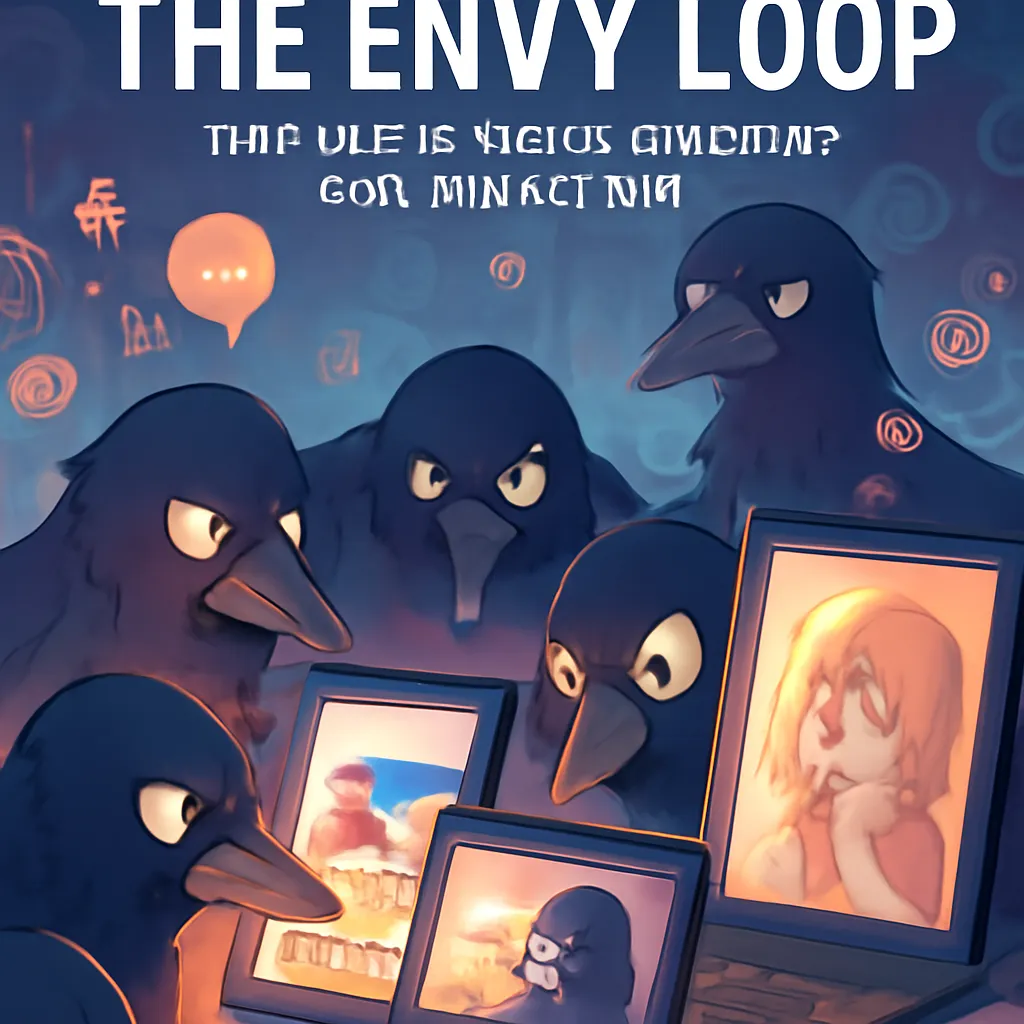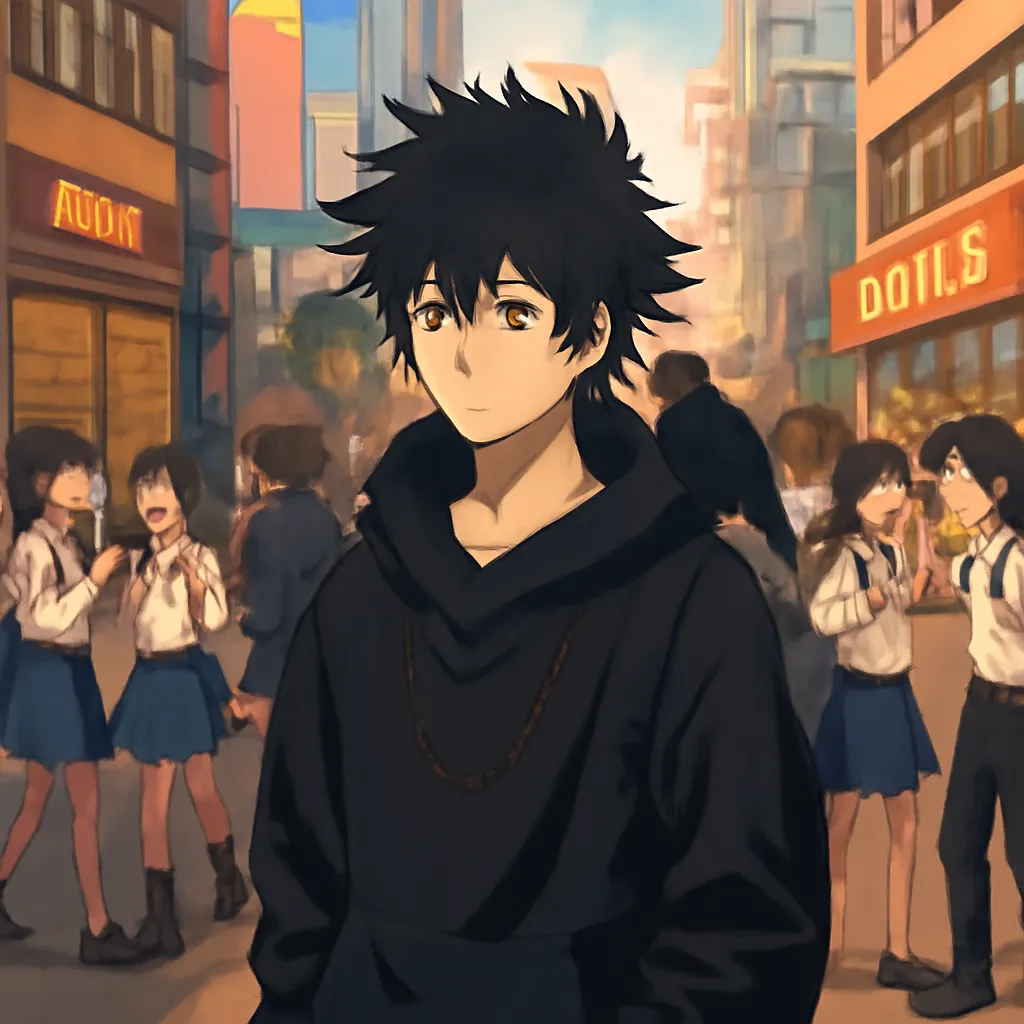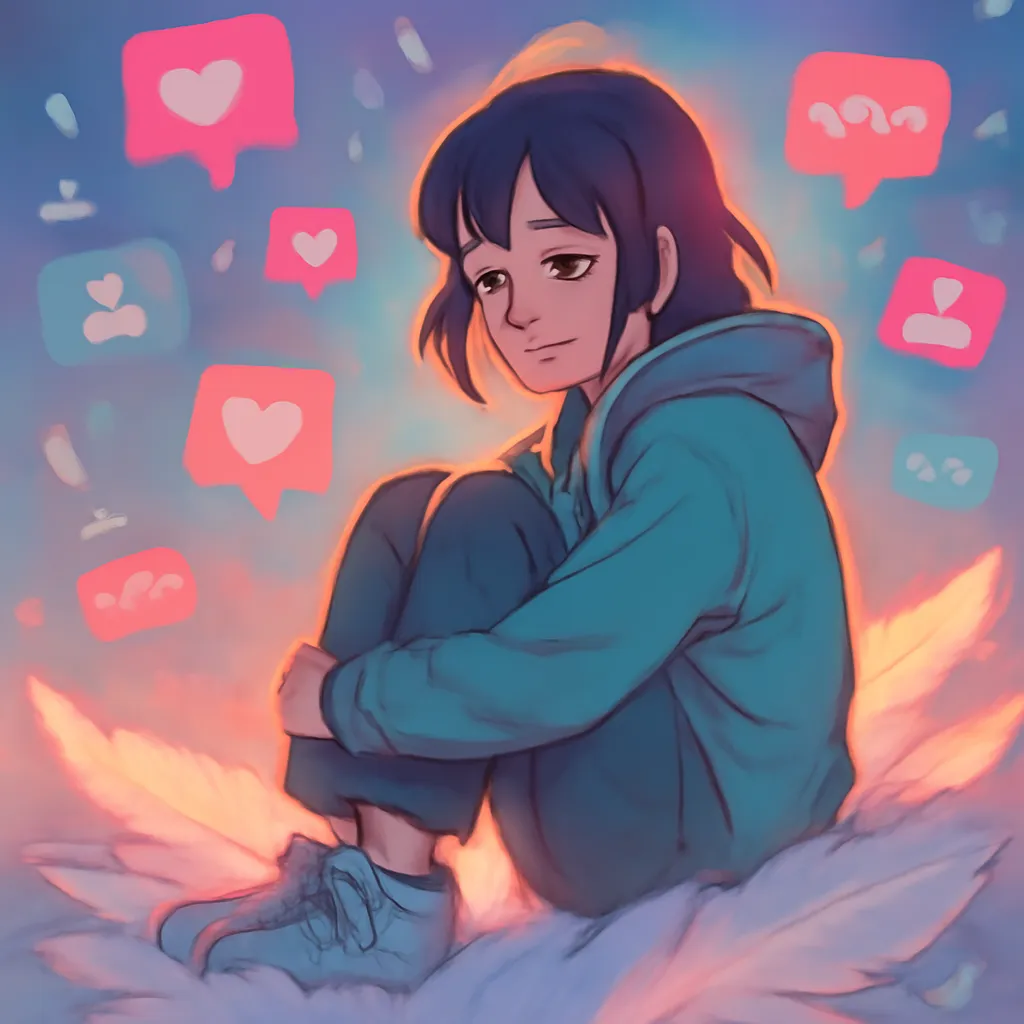One rainy afternoon, I scrolled through my feed and found myself deep in the ‘why am I not like them?’ spiral. An old friend posting their dream vacation, some influencer’s unrealistically flawless breakfast — you know the drill. It’s like a game of emotional hot potato: the more you watch, the more restless you feel. Ever wondered why a random crow might feel the same way about a swan’s shiny feathers and a parrot’s rainbow wings? As wild as it sounds, there’s a lesson about social media buried in that unlikely flock. Buckle up: we’re going on a detour through bird envy, Instagram blues, and that elusive thing called contentment.
Section 1: The Envy Loop — How Social Media Triggers Our Inner Crow
Let’s be honest: you’ve probably felt it, too. That little sting when you scroll past someone’s vacation in Bali, their shiny new job announcement, or a selfie so flawless it looks like it belongs in a magazine. It’s almost like the universe is holding up a mirror, asking, “Why can’t you be more like them?” If you’ve ever felt less-than after a few minutes on Instagram or TikTok, you’re not alone. In fact, you’re living out a modern version of the old fable—the crow who couldn’t help but envy the swan.
In the story, the crow sits on a branch, watching the swan glide gracefully through the water. The villagers gather to admire the swan’s bright white feathers, but the moment they spot the crow, they wave their hands to chase him away. The crow, feeling unwanted and out of place, wonders if he’ll ever be as admired as the swan. Sound familiar? That’s Social Comparison Culture in action—only now, it’s not just happening in a pond, but on every screen you own.
Social Media Effects: Built for Comparison
Social media platforms are designed to make you compare. Follower counts, like buttons, curated feeds—these features aren’t just for fun. They’re engineered to keep you coming back, always measuring yourself against someone else’s highlight reel. It’s almost as if every swipe and tap is a new opportunity to ask, “Am I enough?”
Research shows that about 60% of social media users notice their self-esteem drop after spending time online. That’s not a small number. It means more than half of us walk away from our screens feeling worse about ourselves. And it’s not just a fleeting feeling. Studies indicate that social comparison on social media platforms leads to feelings of jealousy, exclusion, and dissatisfaction, impacting mental health negatively.
Social comparison on social media platforms leads to feelings of jealousy, exclusion, and dissatisfaction, impacting mental health negatively.
Why Envy Feels Inevitable
Here’s the thing: envy isn’t just a glitch in your brain. It’s wired into us. Evolution taught us to look at others, to measure ourselves, to figure out where we stand in the group. But social media takes that ancient instinct and cranks it up to eleven. Now, you’re not just comparing yourself to your neighbor—you’re comparing yourself to millions of people, all at once, all the time.
And it’s not just the numbers. It’s the stories we tell ourselves. You see someone’s “glow up” post and suddenly, you’re questioning your entire 2005 hoodie collection (true story—I still think about that meme sometimes). The dopamine hit from likes and comments can make you crave validation, but it also makes you painfully aware when you don’t get it.
Instagram: The Epicenter of Self-Esteem Struggles
If there’s a villain in this story, it might just be Instagram. Studies have found that Instagram is especially tough on self-esteem, particularly for teens. The endless stream of filtered photos and perfect bodies can leave anyone feeling inadequate. For young people, especially girls, the pressure to look and live a certain way is relentless. Social media effects like these aren’t just statistics—they’re daily realities.
- Curated feeds amplify the pressure to be perfect.
- Validation seeking becomes a habit, not a choice.
- Negative effects on self-esteem are felt by 60% of users.
So, next time you feel like the crow, remember: you’re not imagining it. Social comparison culture is everywhere, and social media users are especially vulnerable. But recognizing the loop is the first step to flipping the script.

Section 2: Spotlight on Teens (and Anyone Who’s Ever Felt Like the Crow)
Let’s pause for a moment and talk about you—or maybe someone you know—scrolling through a feed, heart pounding just a little, waiting for those likes to roll in. If you’ve ever felt like the odd one out, the “crow” in a world of swans, parrots, and peacocks, you’re not alone. In fact, research shows that teens, especially girls aged 10-14, are particularly vulnerable to self-esteem decreases due to social media use and validation seeking behaviors. But this isn’t just a “teen problem”—it’s a human one, and it’s everywhere you look.
The Caged Bird Metaphor: Swans, Parrots, and Peacocks
Remember the story of the crow who envied the swan’s beauty? The swan, in turn, wished for the parrot’s colors, and the parrot longed for the peacock’s dazzling feathers. But here’s the twist: every bird felt trapped in its own way. The swan was admired but kept as a pet, the parrot’s colors landed it in a cage, and the peacock—despite all the attention—was plucked and paraded, never truly free.
It’s a lot like what happens on social media. You see someone’s perfect selfie, their vacation, their “effortless” style, and you wonder, “Why can’t I be more like that?” But what you don’t see is the pressure, the anxiety, the feeling of being caged by expectations. Teen Self-Esteem Impact is real, and it’s amplified by the constant comparison that social media encourages.
Validation-Seeking: The Invisible Cage
Here’s the thing: social media validation seeking can feel like a game you can never win. You post a photo, wait for likes, maybe delete it if the numbers aren’t high enough. (I’ve watched my niece do this—she’ll spend an hour editing a post, only to take it down if it doesn’t get enough attention in the first ten minutes.) It’s exhausting. And it’s not just about the numbers; it’s about feeling seen, accepted, enough.
Studies indicate that the Negative Effects on Self-Esteem are magnified by this cycle. The more you chase validation, the more you feel like you’re falling short. And if you’re in those crucial years—10 to 14, especially for girls—the impact can be even sharper. You’re building your sense of self, but every scroll chips away at your confidence.
Not Just for Teens: The Old Crow’s Dilemma
But let’s be honest: it’s not just teens. Even adults—think of the “old crow” in the story—can feel left out or invisible in a world of curated feeds and highlight reels. You might know, logically, that everyone edits their life online, but it still stings when you see friends gathering without you, or colleagues celebrating wins you didn’t even know were possible.
Teens, especially girls aged 10-14, are particularly vulnerable to self-esteem decreases due to social media use and validation seeking behaviors.
Cyberbullying: When the Cage Hurts
And then there’s the darker side: cyberbullying and the pressure for “likes” can turn emotional wounds into scars. Research shows that cyberbullying and the relentless need for approval can make the pain of exclusion and comparison even sharper, leading to anxiety, depression, and a sense of isolation. The quest for Social Media and Happiness can backfire, leaving you feeling emptier than before.
If only someone had told me in my early teens that everyone feels a little lost sometimes, maybe I wouldn’t have spent so much time editing my life for likes. Maybe you wouldn’t either. The truth? Every swan, parrot, peacock—and yes, even the crow—carries their own invisible cage. And you’re not as alone as you think.

Section 3: When ‘Happy’ Feathers Hurt — Instagram, Anxiety, and the Perfection Illusion
Let’s be honest: Instagram and Mental Health don’t always go hand in hand. You scroll through your feed, and it’s like flipping through a glossy magazine where everyone’s life looks brighter, cleaner, and somehow more “together” than yours. But have you ever wondered what’s really going on behind those perfect pictures? Let’s take a cue from the fable of the crow, the swan, the parrot, and the peacock. Each bird is admired for its beauty, yet none are truly happy. Sound familiar?
Instagram is notorious for fueling the perfection trap. It’s a place where even the happiest-looking “birds” — the influencers, the travelers, the fitness gurus — have struggles you’ll never see. The swan, admired for its beauty, confides, “My feathers may be beautiful, but I am not happy. People keep me as a pet, and I cannot live freely.” The peacock, dazzling in the spotlight, reveals, “People take my feathers and sell them. It is painful when they pluck them, and it keeps happening again and again. I wish I could live freely like you.”
If peacocks had Instagram, would you really want their life after seeing the price they pay for those feathers? This is the perfection illusion at work. On social media, you see the highlight reel, not the behind-the-scenes reality. The result? You start to feel like you’re not enough. Research shows that Instagram is identified as the social media platform most associated with negative impacts on well-being, including body image dissatisfaction and anxiety. The more you scroll, the more you compare, and the more anxious you feel about not measuring up.
It’s not just a feeling — it’s backed by science. Studies indicate that higher social media use, especially on Instagram, correlates with increased anxiety, depression, and poor sleep among young people. Girls, in particular, are at risk, with perfectionism and the “fear of missing out” (FOMO) running rampant. The pressure to curate the perfect feed can leave you feeling exhausted and empty, even when your own life is pretty great.
Here’s a wild thought: What if you posted your most ordinary moment instead of a highlight? Imagine your feed filled with blurry grocery store selfies, messy rooms, or that awkward lunch you ate alone. Would your followers care? Would you? I once posted a blurry selfie at the grocery store — nothing fancy, just me and a cart full of snacks. It ended up being my most-liked photo. Why? Maybe people are craving realness more than perfection.
The fable’s lesson is clear: The swan and the peacock are admired for their beauty, much like those who get attention for curated lives on Instagram — but both reveal they are unhappy beneath the surface. The crow, plain and overlooked, is the only one with true freedom. On social media, it’s easy to wish for someone else’s “feathers,” but you rarely see the hidden cost.
“Instagram is identified as the social media platform most associated with negative impacts on well-being, including body image dissatisfaction and anxiety.”
So next time you’re tempted to compare your life to someone else’s highlight reel, remember: even the happiest-looking birds may be hiding their own cages. Social Media and Happiness isn’t about perfection — it’s about connection, authenticity, and giving yourself permission to be enough, just as you are.

Section 4: Breaking Free — Fragile Birds, Real Joy, and Unexpected Strategies
Imagine this: You’re the crow. You’ve spent ages wishing for the peacock’s dazzling feathers, convinced that if only you could swap your own for theirs, happiness would finally land in your lap. But then, after a surprising conversation, you realize you’ve been taking your own freedom for granted. The old crow’s wisdom hits home—happiness isn’t found by trading feathers, or filters, with anyone else. It’s about valuing your own unique self, right here, right now.
This lesson isn’t just for crows. It’s for anyone who’s ever scrolled through social media and felt “less than.” Research on Emotional Well-Being and Social Media shows that social media addiction is negatively correlated with self-esteem, especially for teens. Body image plays a big role. When you’re bombarded by curated, filtered images, it’s easy to fall into the trap of comparison and envy. But what if you could flip the script?
Gratitude Scrolling: A New Social Media Habit
Here’s a challenge: After every social media session, pause and find five things you genuinely appreciate about your real, current life. Call it gratitude scrolling. Maybe it’s your morning coffee, your favorite hoodie, or the way your dog greets you at the door. This small shift can anchor you in reality and boost your Self-Esteem and Social Media Use in a positive direction.
Experiments in Digital Authenticity
Let’s get real—nobody’s life is perfect, no matter what their Instagram grid looks like. Try sharing unpolished moments. Post a messy kitchen, a bad hair day, or a failed recipe. Limit your “compare-and-despair” time by setting app limits or using reminders. If you catch yourself feeling envious, reframe it as curiosity: What can you learn from that person’s journey, instead of wishing you had their life?
Studies indicate that Social Media Addiction can lead to loneliness and feelings of inadequacy, especially when you’re exposed to idealized images and endless highlight reels. Teens, especially girls aged 10-14, are particularly vulnerable. The pressure to gain likes and comments, combined with cyberbullying, can make self-esteem plummet. But you’re not powerless. You can choose how you engage.
Offline Connection > Online Attention
Here’s some real talk: Most people’s best memories don’t involve their phones. Think about it. The laughter at a friend’s house, the warmth of a hug, the thrill of a spontaneous adventure—these moments happen offline. Research shows that emotional investment in social media intensifies anxiety and depression, while genuine, face-to-face connection boosts Social Media and Happiness in ways no number of likes ever could.
Remember, you are unique, and no one can be a better version of you than yourself.
If peacocks could talk, maybe they’d say, “Freedom > feathers.” The crow’s transformation—from bitter envy to self-acceptance—echoes the journey so many of us need to take on social media. True contentment comes from valuing your own quirks and not chasing someone else’s version of “the good life.”
Practical tip: Use reminders, accountability buddies, or app limits to help you stay grounded. And a little anecdote? The week I deleted Instagram, my plants looked healthier than ever. Turns out, real life flourishes when you give it attention.
- Practice gratitude scrolling after each session
- Share real, unfiltered moments
- Limit compare-and-despair time
- Prioritize offline connection
- Remember: Freedom is better than feathers—or filters
Section 5: Wild Card — A Conversation With Your Inner Crow (Reflection Exercise)
Let’s get honest for a second. If you could sit down with your “inner crow” — that part of you that sometimes feels a little less shiny than the swans on your feed — what would you say? What feathers do you find yourself wishing you had? And, maybe more importantly, what invisible cages are you carrying that others might not see?
It’s easy to forget, especially when scrolling through endless highlight reels, that everyone has their struggles. Research shows that comparing ourselves to others on social media only makes us unhappy. It chips away at our self-esteem, leaving us feeling like we’re never quite enough. In fact, studies indicate that over 60% of social media users report negative effects on their self-esteem, and platforms like Instagram are especially tough on our emotional well-being. We see curated perfection, not the messy reality behind the scenes.
But here’s a little exercise — next time you log off, take a moment to jot down whose “highlight reel” made you feel envious. Was it the friend with the perfect vacation photos? The influencer with the flawless morning routine? Now, flip the script: write down one quirky, real-life thing you actually love about your own day. Maybe it’s the way your dog greets you at the door, or the fact that you made the world’s ugliest (but tastiest) sandwich for lunch. These small, unfiltered moments are the ones that actually fill us up.
Let’s play with an analogy for a second. If you could swap your shoes — or feathers — for a day with anyone online, would you really want their 24 hours, unfiltered? The early mornings, the inbox stress, the arguments, the doubts? Or is it just the shiny bits that look so tempting? Social Media and Happiness aren’t always best friends, especially when we’re only seeing the surface.
Here’s the truth: Emotional Well-Being and Social Media are deeply connected, but not always in the ways we expect. The more we compare, the more we risk losing sight of our own joys. Self-Esteem and Social Media Use are tangled together, and the more we chase someone else’s life, the less we appreciate our own. It’s a cycle — but it’s one we can break.
So, what would it take for you to say, like the crow in the story,
I am happy to be a crow now.Maybe it’s realizing that your “ordinary” is someone else’s dream. Maybe it’s remembering that nobody, not even the swans, has it all together. Or maybe it’s just giving yourself permission to be grateful for what you have, mess and all.
Personally, the best day of my month was a messy one — no perfect photos, no clever captions, just laughter and real life. No one else saw it, but it was mine. And that’s enough.
As you close this page, I hope you’ll remember: breaking the automatic comparison habit takes practice, but it’s worth it. Humanize yourself. Humanize those you envy. Social media will always be there — but your happiness, your self-esteem, and your real life deserve to come first.
So, next time you catch your inner crow wishing for swan feathers, pause. Look around. You might just realize you’re already enough, exactly as you are.




